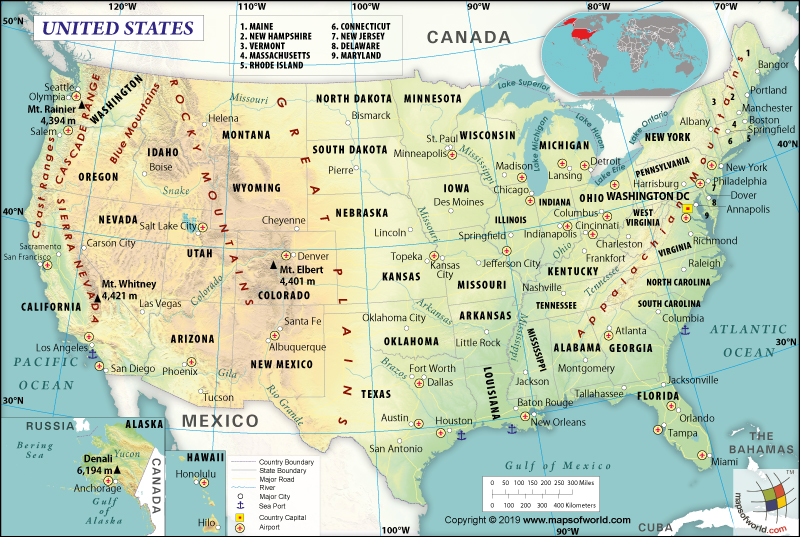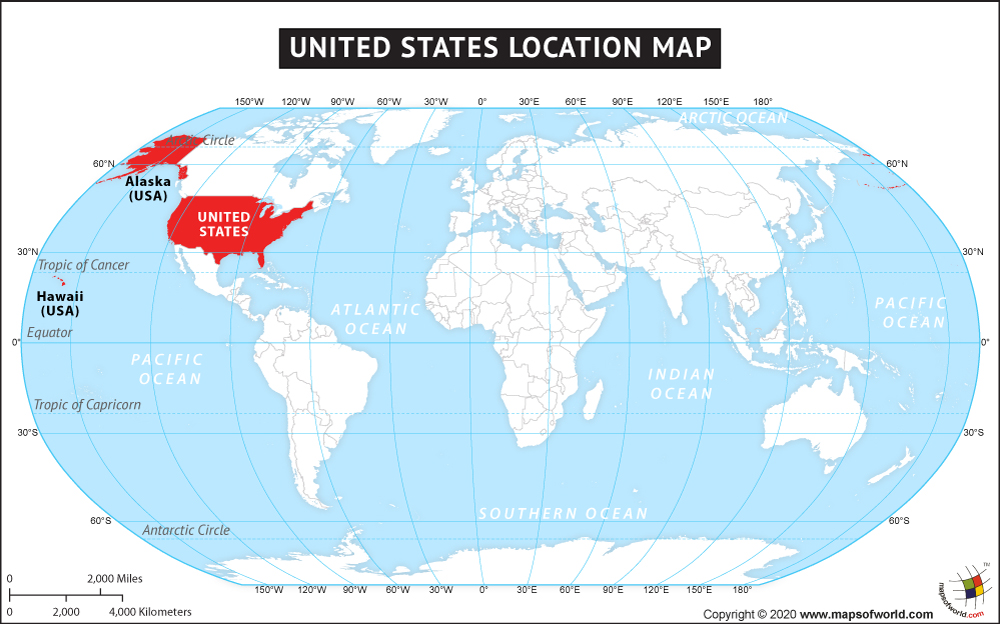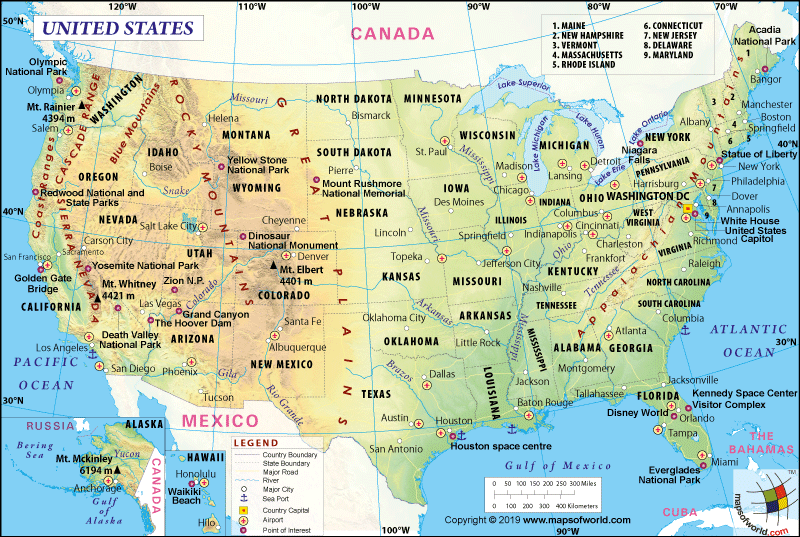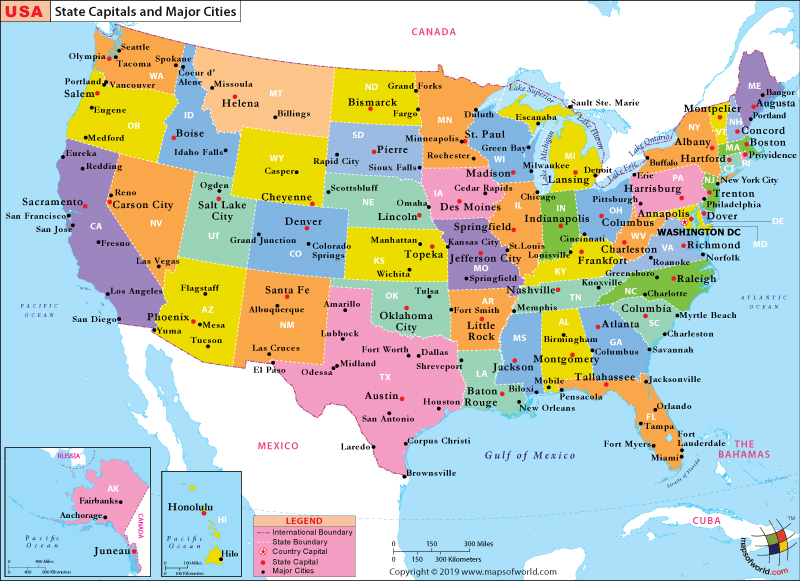What are the Key Facts of United States of America?

|
Official Name |
United States of America |
|
Continent |
North America |
|
Capital |
Washington, D.C. |
|
Largest City |
New York City |
|
Coordinates |
38.000000, -97.000000 |
|
Area |
9,833,520 sq. mi ( 3,796,742 sq. km) |
|
Land Boundaries |
7,575 mi ( 12,191 km) |
|
Coastline |
12,380 mi ( 19,920 km) |
|
Currency |
United States dollar ($) (USD) |
|
Neighboring Countries |
Canada, Mexico. Maritime neighbors- Russia, Cuba, The Bahamas |
|
Population |
327,167,434 (2018 est. ) |
|
Official Languages |
No official language. (English is spoken by majority of the population ) |
|
Major Religion |
Christianity |
|
National Day |
4 July (Independence Day) |
|
National Anthem |
“The Star-Spangled Banner” |
|
Form of Government |
Federal presidential constitutional republic |
|
President |
Donald Trump |
|
Vice President |
Mike Pence |
|
GDP per capita (PPP) |
$ 62,641.0 (World Bank, 2018) |
|
GDP per capita (nominal) |
$ 62,641.0 (World Bank, 2018) |
|
HDI |
0.924 (2017), Rank: 13 |
|
Literacy Rate |
NA |
|
Space Agency |
National Aeronautics and Space Administration (NASA) |
|
Military Expenditure Ranking |
1 (SIPRI, 2017) |
|
No. of Olympic Medals |
2,827 (as of 2018) |
|
Driving Side |
right |
|
Calling Code |
+1 |
|
Time Zone |
UTC−3.5 to −8, Summer (DST) UTC−2.5 to −7 |
|
Internet TLD |
.us |
Where is the United States of America?
The United States of America is located in North America’s western hemisphere. It shares its border in the north with Canada, in the east with the Atlantic Ocean, in the south with Mexico and the Gulf of Mexico, and in the west with the Pacific Ocean. For more informational maps related to USA, check our Thematic Maps section.
The 49th state of the United States is Alaska, which is separated from the contiguous USA by Canada. It shares its boundary in the north with the Arctic Ocean and the Beaufort Sea, in the east by Canada, in the south by the Gulf of Alaska, Bering Sea, and the Pacific Ocean, in the west by the Arctic Ocean, Chukchi Sea, Bering Strait, and the Bering Sea.
The 50th state of the United States is Hawaii (located in the southwest of North America), which is located in Oceania. It is composed entirely of islands, which occupy most of an archipelago in the central Pacific Ocean. In Polynesia, it is the northernmost island group.
What is the Geography of the United States of America?
The United States of America (including 50 states as well as the District of Columbia) has a total area of 9,833,517 sq. km (3,796,742 sq. miles), out of which 9,147,593 sq. km (3,531,905 sq. miles) is land area and 685,924 sq. km (264836 sq. miles) is water area.
While the total land boundary of the USA is 12,048 km (7,486 miles), the coastline is 19,924 km (12,380 miles). Alaska is the largest state in USA, spread across an area of 1,717,856.2 sq km (663,268 sq miles) and Rhode Island is the smallest state in USA. Hawaii in the central Pacific region has an area of 28,311 sq km (10,931 sq miles).
The terrains of the USA include vast plain in the central part, mountains in the western USA, low mountains/hills in the eastern region, broad river valleys as well as rugged mountains in Alaska, and Hawaii’s rugged and volcanic topography.
While the highest point in North America is Mount McKinley’s Denali (6,190 m or 20,308 feet), the lowest point is Death Valley (86 m or 282 feet). The mean elevation is 760 meter or 2493 feet. Mountain ranges in the United States are Alaska Range, Saint Elias Mountains, Wrangell Mountains, Sierra Nevada, Sawatch Range, Cascade Range, and many more.
Some of the highest peaks are Denali, Mount Saint Elias, Mount Foraker, Mount Bona, Mount Blackburn, Mount Sanford, and others.
The major rivers of the USA are Mississippi River, Ohio River, Rio Grande River, Colorado River, and Hudson River. Thousands of lakes (natural and man-made) are there in the US. Some of the largest ones are Okeechobee, Iliamna, Lake of the Woods, Great Salt Lake, Ontario, Erie, Michigan, Huron, and Superior.
As the United States of America is a vast country, the climate varies from one place to the other. In general, the USA’s climate can be categorized as continental. Cold winters and hot summers characterize it. However, the duration of different seasons depends on the latitude as well as the distance from the sea.
The west coast’s climate is cold and damp in the northern part. In its southern region, the climate is the Mediterranean. In the case of the Gulf of Mexico’s coast, the winter is mild, and the summer is hot and muggy. In Florida, the climate is tropical. Therefore, the winter is cold, and the summer is cool-to-cold in the mountainous regions. The deserts in Florida have scorching hot summer and mild winter.
The United States experiences sudden cold waves in the winter season because of the cold air masses from Canada. This is because of the lack of obstacles between the two countries. When these cold spells take place in the winter, the temperature drops significantly below 0 °C or 32 °F. These spells can be intense and prolonged in the inland regions, the north-east, and the highlands.
Just like the cold spells, the heat waves during summer can be intense too, especially in the inland regions.
While the western part of the US is more arid than the eastern regions, the north-central coast of the Pacific Ocean is predominantly rainy.
The western parts of the USA mainly have mountains, plateaus, and desert areas (vast and arid). The central-eastern part of the United States mostly has hills, low mountains, and flat earth. That’s why the climate is rainy and more humid. This area is vast, and that’s why the climatic differences are significantly different. Air masses clash in this part of the US, which makes the climate unstable and any meteorological phenomena (be it tornadoes, blizzards, hail, or storms) can be violent.
The air masses that come from Canada are generally dry and cold. However, as they pass over the Great Lakes, they pick up moisture. The air masses from the Gulf of Mexico are characterized as warm and moist. Higher temperature variations can be experienced in the Great Plains. However, in comparison to the East Coast, they are less humid and rainy, especially in the winter season.
US National Park
The United States is known for the spectacular variety of its natural landscapes, also available in many valleys of the national parks. The captivating scenery and rugged charm of its many natural attractions are best witnessed in the 58 national parks and nature preserves that dot the country. Check this US National Parks Map locating all the national parks in the US.
What is the Economy of the United States of America?
The United States economy is a highly developed mixed economy whose nominal GDP reached US$20.49 trillion in 2018 (World Bank). The nominal GDP increased at a rate of 2.9% in 2018.
The United States of America is a highly diversified and world-leading industrial economy, having the second most prodigious industrial output in the world. Its currency is the US Dollar, the most dominant currency in international transactions.
The US Dollar is the leading reserve currency of the world, thanks to the system of the petrodollar, its central role in a wide array of international institutions since World War 2, the full faith of the US government in reimbursing its debt, and adequate backing from its military as well as science and technology.
The largest trading partners of the United States are China, Canada, Germany, Japan, South Korea, France, UK, Taiwan, and India. Abundant resources (US$45 trillion total estimated value, second highest in the world), high productivity, and well-developed infrastructure help the economy grow. Among the OECD countries, the US citizens have the highest average income (both household and employee).
The USA is also the largest oil and natural gas producer in the world. Reports say 1/5th of the total global manufacturing output takes place in this country. The economy is dominated by the services sector, contributing around 80% to the GDP and employing over 79% of the total labor force of the country. The entire US trade is US$4.92 trillion (2016). Over 134 out of the top 500 companies in the world are headquartered in the USA.
It has the largest consumer market in the world. As it tops the Global Competitiveness Report as well as ranks high in the Ease of Doing Business Index (no.8 in 2019), it attracts immigrants from across the globe. It has the highest net immigration rate in the world.
The figures of 2018 show that the total exports of the United States are US$1.66 trillion, and the total imports are US$2.54 trillion. After touching a high of 9.63% in 2010, unemployment declined to 3.93% in 2018 (World Bank). Also, only around 1.2% of the population was living below the international poverty line of US$1.90 per day in 2016.
What is the Transportation System of the United States of America?
Roadways, airways, railways, and waterways (especially on boats) are the significant means of transportation in the USA. While most of the shorter distance passenger travels take place on the automobile, most of the longer distance ones take place on airways. Railroads, trucks, pipeline, and boats are the preferred modes of cargo travel. Whether it is the perishables or premium express shipments, they are shipped on air.
More than 3.9 million miles of highly developed highways make passenger transportation easy. Passenger vehicles (cars, vans, trucks, and motorcycles) dominate road transportation, accounting for 86% of the passenger miles traveled. Airways, railways, and buses handle the remaining 14% of the traveled passenger miles. Almost all of the non-commuter intercity traffic is carried by the airlines. The US has the highest per-capita vehicle ownership rate (865 vehicles per 1,000 Americans) in the world.
There are 13,513 airports in the US (5,054 paved and 8,459 unpaved). 293,564 km (963,136 miles) of standard gauge railways are present in the country. 41,009 km (134, 544 miles) of waterways is current in the USA, out of which 19,312 km (12,000 miles) are used for commerce. However, some waterways such as 3,769 km (2342 miles) of Saint Lawrence Seaway and 3,058 km (1900 miles) of Saint Lawrence River waterways are shared with Canada. The US owns 3,692 merchant marine (including five bulk carriers, 61 container ship, 115 general cargo, 71 oil tanker, and 3,440 others).
Haymark and LOOP are the main terminals. Miami, Port Canaveral, Port Everglades, Long Beach, and Seattle are the main cruise departure ports for the passengers. The primary cargo ports of the country are Baton Rouge, Los Angeles, Long Beach, Houston, Hampton Roads, Corpus Christi, Baton Rouge, Texas City, Tampa, Plaquemines (LA), New York, and New Orleans.
What International Organizations is the United States of America Part Of?
WTO, G-5, G-7, G-8, G-10, G-20, IMF, WHO, ADB (nonregional member), Interpol, AfDB (nonregional member), Paris Club, ANZUS, NATO, APEC, PIF (partner), Arctic Council, NAFTA, ARF, ASEAN (dialogue partner), Australia Group, BIS, UN, CD, CP, UNCTAD, EAPC, EAS, EBRD, EITI (implementing country), UNESCO, FAO, FATF, IADB, IAEA, IBRD, UNHCR, ICAO, ICC (national committees), ICRM, IDA, IEA, IFAD, IFC, IFRCS, IGAD (partners), IHO, ILO, IMO, IMSO, IOC, IOM, ISO, ITSO, ITU, ITUC (NGOs), MIGA, MINUSMA, MINUSTAH, MONUSCO, NEA, NSG, OAS, OECD, OPCW, OSCE, PCA, SPC, UNITAR, UNMIL, UNMISS, UNRWA, UNSC (permanent), UNTSO, UPU, WCO, WIPO, WMO, ZC, CERN (observer), BSEC (observer), CBSS (observer), CE (observer), CICA (observer), Pacific Alliance (observer), SAARC (observer), SELEC (observer), SICA (observer)
Facts About USA
- The USA has the largest railway network in the world with 293,564 km (2014) of railway tracks. Some of the busiest passenger railway stations in the country are Penn Station (New York City), Union Station (Washington), 30th Street Station (Philadelphia), and Union Station in Chicago and Los Angeles.
- The USA has the maximum number of airports in the world. John F. Kennedy International Airport in New York, Hartsfield-Jackson Atlanta International Airport, and San Francisco International Airport are some of the major US airports.
- Harvard, Yale, Stanford and University of California are premier educational institutions. You get a better idea of Top Universities in the US with this colorful map.
- From cheeseburger of Colordao to hot dogs of Illinois, US cuisine varies in each state.
- The U.S.A acquired Alaska from Russia in the year 1867.
- Alaska’s coastline is longer than the coastlines of all other states combined.
- The U.S.A has no official language.
- The state of Kentucky has the longest cave system in the world.
- The motto displayed on the Great Seal of the U.S.A is “E pluribus unum”, which means “Out of many, one.”
- The United States is known for the spectacular variety of its natural landscapes, also available in many valleys of the national parks. The captivating scenery and rugged charm of its many natural attractions are best witnessed in the 58 national parks and nature preserves that dot the country. Check this US National Parks Map locating all the national parks in the US.
US Trivia
1. Ronald Regan is the oldest person ever to have been elected as the President of USA. He has also lived longer than any former President.
2. The first ever coast-to-coast telephone line in USA was set up in 1914.
3. Some of Mahatma Gandhi’s ashes are at Lake Shrine, Pacific Palisades close to Los Angeles.
4. Known famously as Typhoid Mary, Mary Mallon was the first carrier of typhoid fever in USA.
5. The author of Star Spangled Banner, Francis Scott Key, was a lawyer.
6. John Tyler was the first US President to have got married while in office.
7. Martin Luther King Jr. and his father were both named Michael. When King Jr. was 5 years old both their names were changed to Martin.
8. The real name of General Ulysses S Grant was Hiram.
9. President James Garfield came up with an original proof of Pythagorean Theorem that was published in 1876.
10. 548,000 people were killed in a flu epidemic in 1918.
11. Jimmy Carter was the first US President born in a hospital.
12. The American Girl Guides are also known as Girl Scouts.
13. President William H Taft was appointed the Chief Justice of Supreme Court 9 years after his Presidency by the then President Harding.
14. In 1914 the workers of Ford Company used to receive $5 per day.
15. No star on US’ flag specifically represents any state. There are actually no laws that state as to how they may be arranged.
16. American Indians received US citizenship after steps taken by the national government in 1924.
17. USA was officially born on 4th July 1776 but it did not become one single entity till 1788.
18. An African-American scientist named George Washington Carver invented peanut butter.
19. Martin van Buren is the first America born President of USA.
20. The first US space station Skylab fell into earth in 1979 in thousands of parts.
21. Harry Truman is the only US President of 20th century who did not have college education.
22.Northeastern US, and Canada, experienced snowfall and cold during the summer months in 1816, which is also known as the Year without Summer. A volcanic eruption in Dutch East Indies was blamed for this phenomenon.
23. The inventor of lubricator, Elijah McCoy, was an African American and used the name Real McCoy to differentiate himself from imitators. 24. During the War of 1812 the first rockets were used by the British against Fort McHenry.
25. The Liberty Bell had been cast in London and came to US in 1752.
26. USA had captured Mexico City in 1847.
27. Edgar Allen Poe served as an army cadet at West Point.
28. Both Thomas Jefferson and John Adams passed away on July 4, 1826, 50 years after the Declaration of Independence was signed.
29. Phillus Wheatly, an African female slave, was the first poet in USA to achieve notoriety. Her first poem was published in 13.
30. Roger Sherman is the only shoemaker to have signed the Declaration of Independence.
31. Benjamin Franklin composed his epitaph at 22 years of age.
32. The first official concert of Rolling Stones in USA was held in June 1964 in San Bernardino, California.
33. Amelia Earhart was the first woman to fly across Atlantic Ocean both as a passenger and solo pilot.
34. George Washington commanded the first ever navy fleet of USA. Created in 1775 the fleet had 4 ships.
35. During the American Civil War most soldiers died from various diseases than fighting or gunshots.
36. Mark Twain was born and died on days when the Halley’s Comet could be seen.
37. In 1954 General Motors became the first American company to have a net income of $1 billion.
38. US dollar bills are made from cotton and linen.
39. During 1971 cigarette advertisements were barred from US television.
40. People in US contribute almost 20% of the yearly global garbage generation.
41. The 100th anniversary of swearing in of George Washington, 30th April 1889, was the first holiday celebrated across USA.
42. The Declaration of Independence was written on paper made from marijuana or hemp.
43. John F Kennedy is the only President to have passed away before his parents.
44. The brother of John Wilkes Booth once saved Abraham Lincoln’s son’s life.
45. Lake Mead is the biggest man made lake in US and has been created by Hoover Dam.
46. Almost 55.1% of prisoners in US are in captivity for drug related offenses.
47. Every bank in USA remained closed from 5th to 12th March 1933 so that scared people did not take their money out.
48. Juneau is the largest city in USA at 3000 square miles.
49. US had no income tax before 1913. The 16th Amendment was necessary so that government had control over people’s money.
50. USA is almost the 4th biggest country in the world in terms of area.
Related Links:



